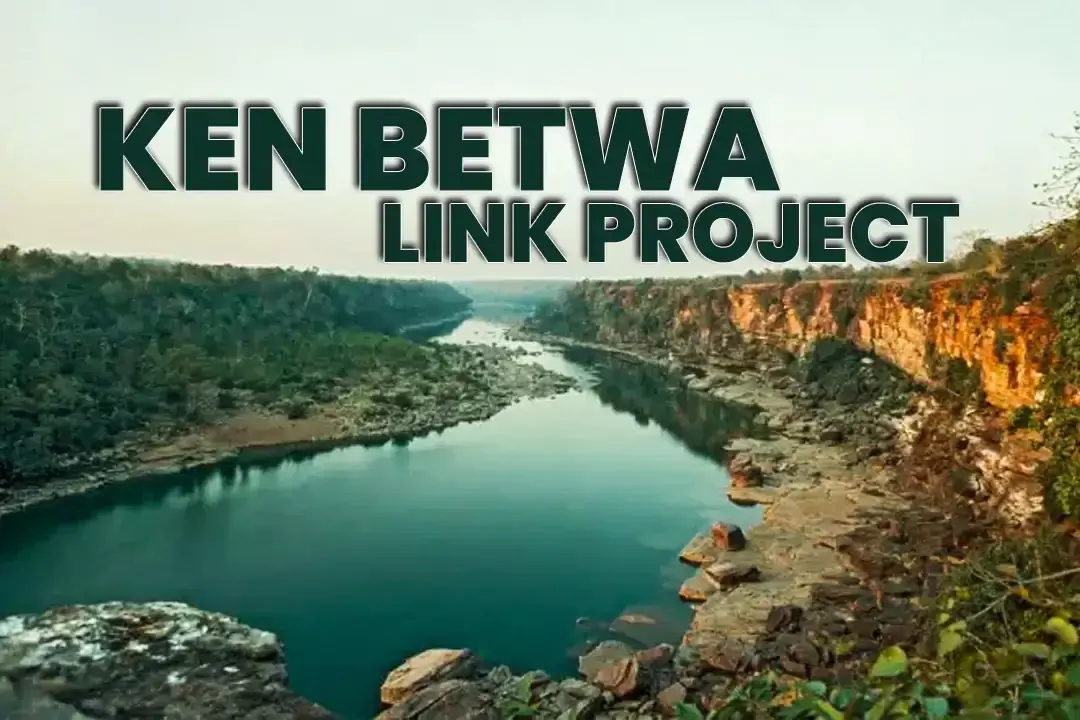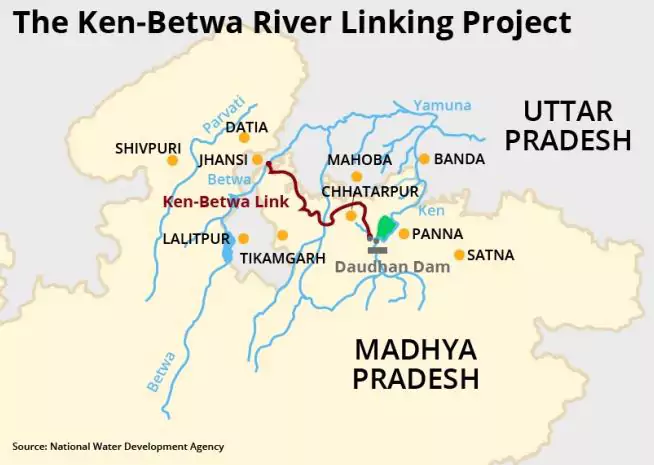Ken-Betwa Link Project
The Ken-Betwa Link Project (KBLP) is the first river interlinking project under the National Perspective Plan. It aims to transfer surplus water from the Ken River in Madhya Pradesh to the Betwa River in Uttar Pradesh, addressing water scarcity and irrigation challenges in the drought-prone Bundelkhand region.
Background:
| Year/Period | Event |
|---|---|
| 1982 | Proposed under the National Perspective Plan. |
| 2005 | Memorandum of Understanding signed between UP and MP. |
| 2021 | Project approved by the Union Cabinet. |
| 2022-2025 | Targeted implementation phase. |
| 2022 Dec | Foundation stone laid by PM Modi on the 8th anniversary of the agreement. |
Project Details
- Implementing States: Madhya Pradesh and Uttar Pradesh
- Total Cost: ₹44,605 crore
- Key Infrastructure:
- Daudhan Dam (77m high, 2.1 km long)
- 221 km Canal to transfer water
- 2 Powerhouses for hydropower generation
- Energy Output: 103 MW (76 MW hydro + 27 MW solar)
- Funding Model:
- 90% by Central Government
- 10% by MP & UP governments
Objectives
- To provide irrigation to 1 million hectares in 2,000 villages.
- To supply drinking water to 6.2 million people.
- To generate renewable energy.
- To promote regional development in Bundelkhand, a drought-prone and
backward area.
Geographical Area Covered
- Origin Rivers: Ken River (MP) → Betwa River (UP)
- Districts Benefitted:
- MP: Chhatarpur, Tikamgarh, Panna
- UP: Jhansi, Banda, Mahoba

Environmental Concerns
- Submergence of forest land: Over 9,000 hectares.
- Impact on Wildlife: Panna Tiger Reserve will be partially affected.
- Deforestation: More than 23 lakh trees to be felled.
- Displacement of communities, especially tribal groups.
- Biodiversity loss in ecologically sensitive areas.
Challenges:
- Inter-state water disputes over water-sharing ratios.
- Delayed clearances from environmental and forest authorities.
- Resistance from environmentalists and NGOs.
- Need for consensus building and legal safeguards.
Importance:
- Irrigation: Will provide irrigation facilities to 10 lakh hectares of agricultural land across 2,000 villages.
- Drinking Water Supply: Will supply safe drinking water to 6.2 million people in water-scarce areas of Bundelkhand.
- Electricity Generation: Expected to generate a total of 103
MW of green energy, including:
- 76 MW hydropower
- 27 MW solar power
- Regional Development: Will contribute to the socio-economic development of the drought-prone and underdeveloped Bundelkhand region, boosting rural livelihoods.
- Water Management and Climate Resilience: Ensures effective utilization of surplus water from Ken River by transferring it to the water-deficient Betwa basin, improving overall water resource management and climate resilience.
The Government considers the Ken-Betwa project a milestone in water governance and a model for cooperative federalism. PM Modi stated that earlier governments neglected water interlinking, but the current regime is focused on long-term water security through river-linking and infrastructure development.












